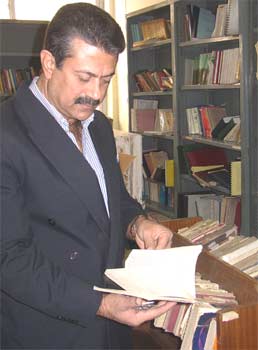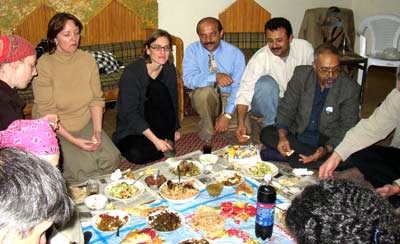|
Peace Team Details | Reports | Messages to
Diary 4 February 2003, Baghdad
Mary Foster
 It is the day before Colin Powell is to give evidence
that he says will prove that Iraq is concealing
weapons of mass destruction. It is on everyone's mind
here in Baghdad - foreigners who are leaving,
foreigners who have decided to stay, Iraqis who are
leaving, Iraqis who have no choice but to stay. All
day it has triumphed in conversations as other
attempted topics have inevitably faltered and fallen
silent in the gorgon gaze of the looming war.
It is the day before Colin Powell is to give evidence
that he says will prove that Iraq is concealing
weapons of mass destruction. It is on everyone's mind
here in Baghdad - foreigners who are leaving,
foreigners who have decided to stay, Iraqis who are
leaving, Iraqis who have no choice but to stay. All
day it has triumphed in conversations as other
attempted topics have inevitably faltered and fallen
silent in the gorgon gaze of the looming war.
Today has been a very busy day, and everything about
me aches. I go through the emotions of the day:
morning's frustration with my inability to connect in
any meaningful way with an academic we interviewed;
the delight of playing with two small and exuberant
children in a new friend's home; the pain of hearing
about the war fears of people that I respect and, in
another situation, would come to know and love. And,
at the end of the day, that incomparable mingling of
joy, love and to-the-death-protectiveness that comes
with holding a baby, feeling its solid little body,
its warmth and vulnerability.
We arrived at Baghdad University in the morning and
were shown into the office of the Head of the
Department of English. The professor welcomed us with
a distancing politeness in polished and
class-establishing English. I feel rather small and
insignificant, uncomfortably noticing the food stain
on my somewhat wrinkled shirt, not an unfamiliar
feeling in such settings. Professor Abdul Sattar Jawad
introduces us to other professors and doctoral
students. I talk to an eloquent drama teacher, Sa'ad
Al- Hassani, who teaches Death of a Salesman, Waiting
for Godot, and a biography of Martin Luther I am
unfamiliar with. He draws out some of the parallels
his students are finding between these works and their
own experiences of living under sanctions and the
threat of war. As he talks, he keeps coming back to
thoughts of his older son. Now 17, his son was alone
in a car eleven years ago when an American bomb hit
the communications tower in Baghdad a short distance
from the car. When Sa'ad ran back to the car, he found
his son speechless and in shock. He didn't regain his
ability to talk for some time.
Sa'ad tells me that the boy is doing well now, a big
fan of baseball. But his war trauma has not entirely
disappeared, and last month he wrote a song about what
he went through. I ask if I would be able to get the
lyrics in English, in the hopes that a musician friend
of mine back home would be willing to put it to music.
His father looks uncertain and changes the topic.
We take a little tour of the English department and
are shown the shabby library with its mutilated and
outdated books, an all too obvious metaphor for the
battering the intellectual life of Iraq has taken over
the past decade. Sa'ad tells us that he plans to
continue to teach through the war, as a simple act of
resistance, a refusal to be cowed by barbarism.
We take a taxi to our next meeting. It is our habit to
give out a sheet in Arabic explaining the Iraq Peace
Team to everyone we meet, and we choose an opportune
moment to hand it to the taxi driver. As we keep our
eyes riveted on the speeding road, he reads it and
then he bursts into the usual approval and
appreciation. I wonder if there is some amusement as
well - the smallness and vulnerability of our action
somewhat ridiculous in the face of such overwhelming
powers - but it is difficult to tell. "You very, very
good," he says, smiling broadly. As usual, we wish
that we spoke more than four words of Arabic. When we
reach our destination, he adamantly refuses to take
any payment for the ride, smiling and nodding.
 Our next stop is the home of Amal, a teacher, mother
and artist. She has been a long-term friend of Voices
in the Wilderness, a warm and sparkling-eyed woman.
She welcomes us in as though we are already good
friends. She understands well what we are trying to
do, and is generous in answering our questions about
how her children are faring under the threat, how she
is preparing for the war, how the sanctions have
affected her life and work as a teacher. Her older
son, Omer, about eight years old, with his snappy hair
cut and black leather jacket, looks like a little rock
star. Her daughter Abeer wears a pink "Barbie" jumper.
All three of her children are very good looking and
love to draw. The two boys draw pictures of Jackie
Chan, bicycles, cars, tanks and soldiers. Abeer draws
fashionable women and bright-coloured flower gardens.
As they draw, Amal tells us that she can't hide
anything from the children - everyone is talking about
the coming war. Abeer is too young to remember the
time that their neighbours' house was demolished by a
bomb; the mother, grandmother and one of the children
killed. That was in 1993, when they were living close
to one of Baghdad's bridges. But she isn't too young
to understand and to feel the terror of the current
situation. Amal is planning to get out of Baghdad, to
try to weather the war in the countryside where the
bombs are less likely to find her children. She takes
the US government at their word when they say that
there won't be a safe place in Baghdad. In 1991, she
preferred to stay in Baghdad, refusing to bow to the
very real danger. But now, with three children,
everything is different.
Our next stop is the home of Amal, a teacher, mother
and artist. She has been a long-term friend of Voices
in the Wilderness, a warm and sparkling-eyed woman.
She welcomes us in as though we are already good
friends. She understands well what we are trying to
do, and is generous in answering our questions about
how her children are faring under the threat, how she
is preparing for the war, how the sanctions have
affected her life and work as a teacher. Her older
son, Omer, about eight years old, with his snappy hair
cut and black leather jacket, looks like a little rock
star. Her daughter Abeer wears a pink "Barbie" jumper.
All three of her children are very good looking and
love to draw. The two boys draw pictures of Jackie
Chan, bicycles, cars, tanks and soldiers. Abeer draws
fashionable women and bright-coloured flower gardens.
As they draw, Amal tells us that she can't hide
anything from the children - everyone is talking about
the coming war. Abeer is too young to remember the
time that their neighbours' house was demolished by a
bomb; the mother, grandmother and one of the children
killed. That was in 1993, when they were living close
to one of Baghdad's bridges. But she isn't too young
to understand and to feel the terror of the current
situation. Amal is planning to get out of Baghdad, to
try to weather the war in the countryside where the
bombs are less likely to find her children. She takes
the US government at their word when they say that
there won't be a safe place in Baghdad. In 1991, she
preferred to stay in Baghdad, refusing to bow to the
very real danger. But now, with three children,
everything is different.
We spend the early evening with a sculptor we met on
our second day in Baghdad. He is becoming well known,
but is generous with his time. He is on his way out of
the country, invited by friends to show his work in
Spain, and possibly France. We speak and joke easily
together and I soon feel comfortable enough to ask him
how he feels about leaving the country at this time. I
regret it immediately as the pain registers on his
face. All his brothers and his father are in the army,
and his mother is in Basra, close to the border where
US troops are amassed. He recalls the terror of the
first night of the war in 1991, when he was a young
teenager, huddled with his brothers in the basement of
his family home with the bombs falling around them.
They had only two gas masks among the eight of them,
and kept passing them around, each brother insisting
that the others take them. The lack of water,
electricity, food during the bombing and the immediate
aftermath; the long years of hardship afterwards. The
oil for food programme, and possibly his own success
(though he doesn't say so), finally brought respite.
But now it starts again! He is a very open person, and
his emotions show clearly on his face. I want so badly
to comfort him, but a sense of my powerlessness dries
up all my words. We sit in silence for a few moments,
and then make yet another attempt to talk of something
else.
In the evening we find ourselves in the surreal
surroundings of a sixties-style bowling alley,
swirling green walls as a backdrop to a fantastic mix
of people: our sculptor friend, the international
media, friends from Enfants du monde, MSF and other
international NGOs, Iraqi friends, an American women's
delegation all dressed in bright pink, and of course
the omnipresent Hassan, a shoeshine boy who has
practically made himself a member of the Iraq Peace
Team. It is a fund-raiser that Iraq Peace Team
members have organised for Enfants du monde and
Bridges to Baghdad. Both NGOs are struggling to
provide some relief to the children here. Their work
is heart-breaking and difficult.
Mahmoud shows up. He is a Masters student from Yemen
who was planning to get out of Iraq, but decided to
stay when he heard about the Iraq Peace Team coming to
show solidarity with Iraqis. I am moved by the
solidarity but sorry that he has put himself in
danger. He rounds up about ten of us from Canada and
the US and takes us home for dinner. Most of his other
guests are from Yemen; only one, a professor we had
coincidentally met that morning, from Iraq. The
professor has a wry smile on his face and indulges in
teasing some of the more credulous among us, playing
up to stereotypes of Muslims current in North America.
As we eat from the same plates and very literally
share bread with each other, the Yemenis open up. "Why
is the US doing this to us?" "Why do Canadians and
Americans not stop their governments from committing
these crimes?" "Don't they understand that this is
only creating a backlash?" "Our quarrel is not with
ordinary Americans, but ..."
Mahmoud lets me hold his four month year old son,
Mohammed. At this point I really have to struggle not
to cry when Mohammed happily snuggles into my arms.
Their apartment is not in a safe location. What is in
store for these good people, who are now my friends?
|